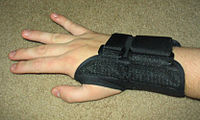
Photo from wikipedia
Background Psychological factors may impact recovery in patients undergoing treatment for shoulder complaints. The aim of this review is to systematically analyse the evidence for the effect of modifiable psychological… Click to show full abstract
Background Psychological factors may impact recovery in patients undergoing treatment for shoulder complaints. The aim of this review is to systematically analyse the evidence for the effect of modifiable psychological factors (MPF) on outcome, for patients with musculoskeletal shoulder disorders undergoing conservative or surgical treatment. MPF refers to factors that may change with intervention. Methods This is a systematic literature review. Five databases searched (MEDLINE, CINAHL, Cochrane Library, Embase and PsycInfo), for longitudinal studies investigating the influence of MPF on prognosis of patients with shoulder disorders, all diagnoses, undergoing clinical interventions (conservative or surgical). Level of evidence was determined using Scottish Intercollegiate Guidelines Network (SIGN) methodology. Moderate and high quality evidence was included. We extracted all MPF, categorized constructs into the following domains: beliefs (self-efficacy, expectation of recovery), coping (catastrophizing, avoidant coping), and affect (depression, anxiety). We evaluated constructs for its predictive value of at least one outcome. Outcomes were informed by this review. Evidence was classified into three categories: evidence for, inconclusive evidence, and evidence against. Results Of 1170 references, 40 distinct publications based on 35 datasets were included (intervention type: 20 surgical; 20 conservative). Overall, 22 studies (20 cohort studies and 2 RCTs) were classified as high quality and 18 studies (16 cohort studies, 2 RCTs) were classified as moderate quality. Outcomes reported included pain, disability/function, perceived recovery, physical and mental health, and work status. Based on the review, of the psychological constructs explored, these data would suggest that expectation of recovery, catastrophizing, avoidant coping, depression, and anxiety may predict outcome for patients managed surgically. In patients undergoing conservative intervention the evidence was either against (catastrophizing, depression, anxiety) or inconclusive (self-efficacy, expectation of recovery, avoidant coping) for the predictive value of psychological factors on outcome. Conclusions Five constructs were predictive of outcome for surgically managed patients. This suggests that implementing the biopsychosocial approach (i.e., preoperative screening, intervention by a trained clinician) may be advantageous for patients recommended for shoulder surgery,,. The same is not indicated for conservatively managed patients as no conclusive association of MPF with outcomes was noted. The importance of other MPF on outcome requires further investigation.
Journal Title: BMC Musculoskeletal Disorders
Year Published: 2021
Link to full text (if available)
Share on Social Media: Sign Up to like & get
recommendations!